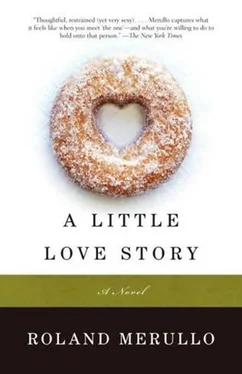“You wouldn’t be able to race anymore.”
“Get your priorities straight,” he said. “It would be a way of getting inside her body without actually betraying my best friend. You gonna compare bike racing with that, Colonel?”
“No.”
“Good. You’re still in the general vicinity of sane, then. Go home and let me sleep.”
I DROVE HOME and went to bed for a while and then got up and put my clothes back on. I went into the painting room and walked in circles. I looked at the unfinished paintings in one of my racks, paced some more, stood at the window. Usually if I leave a canvas alone for a month or two, I come back to it with a fresh eye. I see everything that’s wrong and I think I see how to try to make it right. It’s something like looking back on your own life and being able to change part of it-things you blurted out, people you should have been kinder to, or blunter with-except that your life is cut in stone and your painting mistakes are only blots of colored oil pressed onto linen. Those patches of color show the deep patterns of your mind, though, which is why it seems so important to get them exactly right.
The painting of Janet in her sea-green pajamas was sitting in one of the racks I’d built. When I took it out and set it up on the easel I could see how little I had known her when I did it. She looked smart and pretty, when in fact she was smart and pretty and almost unbelievably brave. Every morning when I walked into her room at the hospital I could see that bravery in her because all through the night she had been a step or two this side of suffocation. Every day she coughed up and spit out as much as a quart of green and bloody mucus-not pleasant to think about, excuse me. But she did that, lived that. Not once, not just one awful time, but night after night. Not one sip of GoLYTELY, but glass after glass. Not one annual invasive procedure, but dozens of them-bronchoscopies, enemas, throat cultures, sinus irrigations, shunts, IVs, pinpricks, blood tests, intestinal surgeries-from the time she was old enough to hold her head up without help. And she woke up day after day and went about her life, trying to be pleasant, wanting to be normal, working, cleaning her apartment, facing everything she had to face without making a big fuss about it. There was no way to measure bravery like that. There were no medals given for it. Instead of calling you a hero and making a fuss over you on TV or in the magazines, people heard the wet cough and shot you nasty looks, moved away from you in subway cars, made remarks in movie theaters. Natural enough from their point of view, maybe. But a kind of second-degree torture for Janet. I had not understood all that when I tried to put her on a canvas.
So I mixed white and red and brown in different amounts on different places on my glass-topped table until I had a shade of skin that seemed right, then I wiped almost all the paint from the brush and ran the tip of the bristles diagonally in under her cheekbones, one stroke each side. I cut a sixteenth of an inch from her smile, one stroke each side. Each of her irises got one more spark of light. I tried to make it so you could see the tiny hairs on the veins on the backs of her elegant hands, and I made her hair shinier than it had been in months. In all, I put maybe ten touches of paint on the canvas.
And then, just before going to bed, I ran some lighter gray here and there into the background, because the first time around I had made it one shade too dark.
IN THE MORNING I brought Janet flowers with the raspberry muffin, but I did not say anything about what I’d seen on the computer the night before. It was not easy to do that, and I was not sure it was the right thing to do. But hope is an almost-tame lion-gorgeous to look at and capable of turning on you in a nanosecond. According to the nurses on duty, she’d had a miserable night and couldn’t eat or talk, and I didn’t want anything else that could hurt her to be in the room then. I stood or sat by the bed and held her long fingers. I pulled the blanket up an inch higher on her chest. I wiped away the saliva that dribbled down her chin. A little bit after eight o’clock she moaned and slowly woke up. We made eye contact, she squeezed my hand, and I almost told her. There was just about nothing left of her-the beating heart, a few weak puffs of air, the movement of her eyes, enough strength to say, “Hi, Joe Date,” in a voice that was like three scratches from a broken violin. I opened the get-well cards from her cousins and coworkers, one from the governor himself. I read them to her and turned them so she could see what people had written: how much they missed her and were praying for her; how they knew everything would be fine. When I couldn’t stand to be there anymore, I kissed her eyelids, said I would be back that night, and went out of the room as if I were only headed off to work.
Doctor Ouajiballah weighed maybe a hundred and forty pounds. I nearly knocked him flat going fast around a corner of the hospital corridor, looking for him. I didn’t even say I was sorry, or good morning. I said, “Living lobar transplant.”
He lifted his coffee-brown eyes to me and said, in his soft, lilting, Pacific Island voice, “Yes?”
“Why didn’t anyone tell us about a living lobar transplant?”
“I assumed Doctor Wilbraham had done so.”
“He didn’t.”
“I assumed you knew it was one option.”
“We didn’t. Is it an option?”
He pinched his lips together and tilted his head sideways. “It’s not commonly done, sir. You would need two donors.”
“We have them.”
“They would have to match blood type or be O-positive.”
“I’m O-positive.”
“The other donor would have to be. And be of a certain size. Each lobe would have to be large enough to take up much of the space left by the removal of a whole adult lung. The body abhors a vacuum, sir.”
“He’s an inch shorter than me. He’s a champion bicycle racer.”
“You cannot be a smoker, or an asthmatic. You will have to be in excellent cardiovascular condition. The psychological motivation must be appropriate.”
I looked at him.
“There are many factors,” he added weakly.
I said, “The insurance company won’t pay for it, am I right?”
He pinched the skin over his Adam’s apple and shifted his eyes to the back of a passing nurse.
“Will they pay for something like that or not, at this point?”
“It’s a quarter of a million dollars, at a minimum.”
“Will they, or not?”
“They do not like to, not in general. In the case of the types of bacteria Janet harbors-one bacterium in particular-the data on survival after such a procedure is not encouraging. Many hospitals will not do it.”
“Has this hospital ever done it?”
“Yes.”
“On somebody with that bacterium?”
“Yes. In fact, twice that I am aware of.”
“And the people lived?”
“Yes, at first. One is still alive.”
“Will you recommend it for Janet, officially, in writing?”
“Many surgeons will not do it.”
“Is there a surgeon here who does it?”
“There was. The very finest surgeon. He retired three weeks ago, unfortunately. If he were here I would recommend it. But, if we were to do it now, without him, we would have to go to New York. If the donors are qualified. If the insurance company will pay. If patient is strong enough to endure traveling, and to survive the procedure itself.”
There was a bustle of traffic in the hallway. Someone rolled an empty gurney past us and we moved aside. A doctor came hurrying in the opposite direction and nodded at Ouajiballah. He nodded back at her.
Читать дальше












